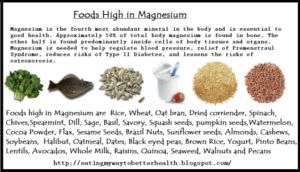Different Symptoms Are Related to Low Magnesium
- Magnesium helps you sleep
- Magnesium calms your mind
- Magnesium reduces muscle cramps
- Magnesium relieves headaches
- Magnesium strengthens bones
- Magnesium lowers blood pressure
Magnesium is involved in over 600 enzymatic reactions in your body.
Magnesium deficiency manifests in many different ways and can mimic so many other disorders that it is extremely difficult to correctly diagnose. Here are some symptoms associated with low magnesium:
Low Magnesium Symptoms
Until recently, I have not really given much thought to magnesium and what it does throughout our bodies if we have low magnesium. On a molecular level, I have known for quite some time that magnesium is involved in numerous chemical reactions in the body, but it never really clicked with me how very important it is. That all changed when I started having heart palpitations a few weeks ago. I have never had any heart problems in the past. I have never had a murmur or arrhythmias (irregular heartbeats) and all EKGs were “disgustingly normal” (as a doctor once told me). So, naturally, I was very worried when, out of the blue, I started feeling a pressure in my chest, fluttering of my heart and was experiencing a drop in blood pressure, increase in resting heart rate and occasionally irregular heartbeats. After weeks of testing, all anyone could tell me was that MAYBE I was deficient in magnesium. So that made me want to find out more…

Believe it or not, testing for magnesium levels in the blood is extremely inaccurate. Serum magnesium (magnesium in the blood) accounts for about 1% of magnesium in the body’s tissues. 1%!! So, when having your blood tested, take that result with a grain of salt because it may or may not be telling you the entire story.
Muscular Symptoms of Low Magnesium
- Weakness
- Muscle spasms
- Tics
- Muscle cramps
- Hyperactive reflexes
- Loss of muscle coordination
- Tremors
- Involuntary eye movement or vertigo
- Difficulty swallowing
Low magnesium levels can lead to various muscular symptoms. Muscle cramps are a common symptom, often occurring in the legs or feet. These cramps can be painful and may last for several minutes. Additionally, muscle weakness can be experienced, making it difficult to perform everyday tasks. Twitching or spasms in the muscles, known as fasciculations, can also occur. These involuntary movements can be bothersome and may be more noticeable at rest. In severe cases, low magnesium levels can even lead to muscle tremors or convulsions. It is important to address low magnesium levels to alleviate these muscular symptoms.
Neurological Symptoms of Low Magnesium
- Behavioral disturbances
- Irritability and anxiety
- Lethargy
- Loss of memory and cognitive function
- Loss of appetite
- Nausea and vomiting
- Seizures
Low magnesium levels may also lead to a variety of neurological symptoms. These symptoms may include muscle twitches and cramps, numbness and tingling in the extremities, seizures, and even changes in mental status such as confusion and irritability. These neurological symptoms can worsen if low magnesium levels are not properly treated.
Cardiovascular Symptoms of Low Magnesium
- Irregular or rapid heartbeat
- Coronary spasms
When magnesium levels are low, it can cause irregular heart rhythms, also known as arrhythmias. Similar to muscular and neurological symptoms described above, low magnesium can lead to cardiovascular (heart) symptoms. These abnormal heart rhythms can range from mild palpitations to more serious conditions like atrial fibrillation. Additionally, low magnesium levels can contribute to high blood pressure, as magnesium helps relax and dilate blood vessels. This can put added strain on the heart and increase the risk of heart disease. It is important to monitor magnesium levels and address any deficiencies to maintain a healthy heart and cardiovascular system.
Metabolic Symptoms of Low Magnesium
- Increased intracellular calcium
- Hyperglycemia
- Calcium deficiency
- Potassium deficiency
One common metabolic symptom of low magnesium is muscle weakness and cramps, as magnesium plays a crucial role in muscle function and contraction. Additionally, low magnesium can cause fatigue and weakness, as it is involved in energy production at the cellular level. Another symptom is poor appetite and nausea, as magnesium is necessary for proper digestion and nutrient absorption. Lastly, low magnesium can affect mood and mental health, leading to symptoms such as anxiety, irritability, and difficulty concentrating. Overall, maintaining adequate magnesium levels is essential for optimal metabolic function and overall well-being.
Also, be on the lookout for bone issues. When your body is in a state of “functioning” low magnesium, the body will strip magnesium from bone to utilize it in other biochemical reactions which can cause damage to the bones. If this is occurring, testing for magnesium levels will likely return normal, which can lead to a missed diagnosis.
Conditions Commonly Associated With Low Magnesium
Conditions commonly associated with magnesium deficiency include depression, chronic fatigue syndrome, ADHD, epilepsy, Parkinson’s disease, sleep problems, migraine headaches, cluster headaches, osteoporosis, premenstrual syndrome (PMS), chest pain (angina), cardiac arrhythmias (irregular heartbeat), coronary artery disease or atherosclerosis, hypertension, type II diabetes, and asthma. The presence of any of these conditions could point to chronic hypomagnesemia (low magnesium).

Best Foods to Eat to Combat Low Magnesium
Some of the best foods to eat include dark leafy greens such as spinach and kale, nuts and seeds like almonds and pumpkin seeds, legumes such as black beans and chickpeas, whole grains like quinoa and brown rice, and fatty fish such as salmon and mackerel. Additionally, including foods like bananas, avocados, and dark chocolate can also provide a good source of magnesium. Make sure to include these foods in your meals to ensure you are getting enough magnesium to support your overall health and well-being.
So…after about two weeks of adding magnesium rich foods and taking magnesium supplements, my original symptoms of heart palpitations, decreased blood pressure and increased heart rate have all practically disappeared. I guess the doctors got it right. I will continue to supplement magnesium in order to keep my body running as efficiently as possible. If you think that you may have a magnesium deficiency, talk to your doctor before you start taking supplements to confirm that is the problem. I wouldn’t want any of you taking supplements unnecessarily.
